
“Is this for real?” I asked myself, as did countless others, after Houston Texans’ all-star running back Arian Foster tweeted the MRI image of his injured hamstring during the final week of the preseason. I went scrambling to message boards and news sites to find out if my first-round fantasy football draft choice would really miss part of the season due to injury. After years of playing, I finally scored a top-3 pick in the draft for the first time in my fantasy-football career. Thanks to Twitter, my fantasy football fantasy came crashing to an end. Let’s just say the first three weeks of this season without Foster were, for lack of a better word, brutal.
As news broke of Foster’s injury, there was also something else going on. Fans and fantasy football players especially started to harass Foster and even sent death threats. While Foster was quick to point out that he would be fine for the season opener, ESPN and every other sports media outlet it seems had experts saying otherwise.
Over the past few years, Twitter has soared to the top of the elite social media platforms. This instant connectivity comes with consequences. Not only did Foster’s actions anger his fantasy owners, but it also alerted Houston’s first week opponent, the Indianapolis Colts, that the top running back in the league was more than likely not going to play and they were better prepared for the other running backs on the team.
The instant updates that can come from tweets changed the way journalists cover the game. Now whenever something significant happens on or off the field, Twitter is the first thing reporters like Denver Post sports writer Lindsey Jones turn to in order to break news (Jones). Twitter has become so popular that the NFL has put restrictions on the use of the application during game days and other events. What would seem like harmless tweeting, the NFL views it as a hazard to its players and teams.
The NFL has done stranger things than its implemented social media policy (Michael Vick I’m looking at you…). It prohibits use of Twitter, Facebook, etc… 90 minutes before a game by all players and team staff until after the locker room interviews are finished. Teams also can add their own stipulations to the policy. Jones recalls stories of having to run outside the Denver Broncos’ practice facility to break a story because the team bans cellphone use of any kind inside its doors (Jones).
The NFL is advocating more use of social media through the teams as a whole though. They have a new initiative this season to get the teams to start using social media as a way to interact directly with fans (Drell). “We’re increasingly focused on engagement, acquisition and community… We’re rebuilding the fan base and the avidity of the fan base — if non-fans get engaged, casual fans get more involved and avid fans become super avid fans,” said Jeff Berman, GM of NFL Digital (Drell).
Fantasy football is playing a large part in this new social media push by the NFL. Fantasy players drive “massive” amount of online fan interactions said Berman (Drell). The NFL Red Zone channel originated from the demand of fantasy players to be able to watch in real time, scoring plays from out-of-market games. Not only does the NFL have a main Twitter account, they also offer one that is dedicated to top-fantasy news and numerous fantasy football experts registered. They realize the gold-mine they have in fantasy football are trying to keep up with it.
Sources:
Drell, Lauren. “How the NFL is Dominating Social Media.” Mashable. 18 Oct 2011. Web. 21 Oct 2011. http://mashable.com/2011/10/18/nfl-digital/
Jones, Lindsay. "The sports tweet: new routines on an old beat." Nieman Reports 64.4 (2010): 56+. Academic OneFile. Web. 22 Oct. 2011.
"Twitter War Breaks Out Over Arian Foster's Hamstring Injury." Khou.com. 31 Aug 2011. Web. 21 Oct 2011.

